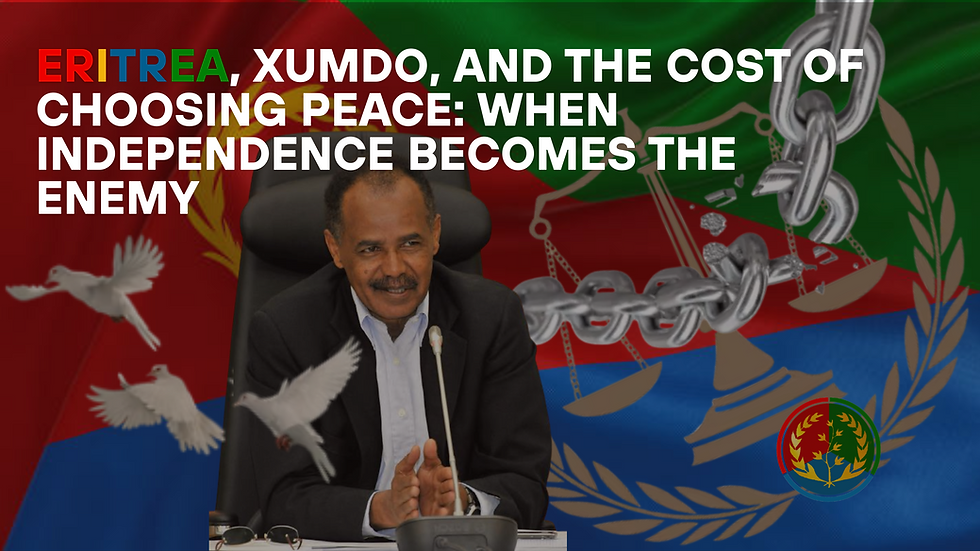President Isaias Afwerki’s Criticism of the IMF and World Bank: A Stand Against Western Dominance
- Nakfa Eritrea
- Dec 6, 2024
- 4 min read
President Isaias Afwerki of Eritrea has long been a vocal critic of the International Monetary Fund (IMF) and the World Bank, institutions he perceives as instruments of Western hegemony over developing nations. His criticism stems from Eritrea’s commitment to self-reliance, sovereignty, and resistance to foreign interference—principles that have shaped his leadership since Eritrea’s independence in 1993. Afwerki’s stance aligns with a broader critique from many leaders in the Global South who argue that these institutions perpetuate economic dependency and exploitation, maintaining a neocolonial order under the guise of development.
The IMF and World Bank have a complicated history in Africa, marked by policies that have often exacerbated rather than alleviated poverty and inequality. Established after World War II to promote global economic stability and development, these institutions became particularly influential in Africa during the 1980s and 1990s, when many nations faced economic crises and turned to them for financial assistance. However, loans from the IMF and World Bank came with stringent structural adjustment programs (SAPs), requiring countries to cut public spending on essential services, privatize state-owned enterprises, and open their markets to foreign competition. These measures, while touted as necessary for economic reform, often led to devastating consequences. African economies suffered from increased poverty, rising unemployment, and the erosion of national sovereignty, with many nations becoming trapped in cycles of debt and dependency. This legacy underpins Afwerki’s deep skepticism toward these institutions.
After Eritrea gained independence from Ethiopia in 1993, it inherited an economy weakened by decades of war. Unlike many newly independent African nations, Eritrea refused to rely on IMF or World Bank loans. Instead, President Afwerki championed a development model rooted in self-reliance and grassroots mobilization. He prioritized building an economy that did not depend on foreign aid, investing in agriculture, infrastructure, and education using domestic resources. Afwerki has consistently warned that borrowing from institutions like the IMF and World Bank would force Eritrea to cede control of its economic policies to external actors whose agendas often conflict with national interests. For Eritrea, rejecting these loans was not merely an economic decision but a political statement affirming its sovereignty.
Afwerki’s broader critique of the IMF and World Bank focuses on their role as tools of Western dominance. He has argued that these institutions, while ostensibly promoting development, primarily serve the geopolitical and economic interests of wealthy nations. Through their loan conditions, they often dictate economic policies that benefit Western corporations at the expense of local populations. For example, structural adjustment programs frequently require privatization of natural resources, opening them up to exploitation by foreign investors. Such policies, Afwerki contends, undermine local industries, increase inequality, and perpetuate poverty rather than fostering sustainable growth. Furthermore, the decision-making structures of the IMF and World Bank are heavily skewed in favor of Western powers, particularly the United States and Europe, reinforcing the perception that these institutions lack accountability and primarily serve the interests of the Global North.
In response to these challenges, Eritrea has pursued a development strategy that rejects the neoliberal framework promoted by the IMF and World Bank. Under Afwerki’s leadership, the country has maintained state control over key industries and resources, ensuring that national wealth is reinvested in public goods rather than extracted by foreign corporations. Eritrea has also taken a firm stance against the exploitation of its natural resources, negotiating agreements with foreign investors that prioritize benefits for the Eritrean people. This approach, while controversial and often criticized by Western governments and organizations, reflects a commitment to maintaining sovereignty and resisting external domination.
Afwerki’s critique of the IMF and World Bank is echoed by many leaders and thinkers in the Global South. From Latin America to Asia and Africa, structural adjustment programs have often led to economic stagnation and increased inequality, as seen in countries like Argentina and Zimbabwe. In response, some nations have turned to alternative financial institutions, such as the BRICS New Development Bank, which offer loans without the harsh conditionalities associated with traditional Western lenders. There are also growing calls for reform within the IMF and World Bank, with demands for fairer voting structures and an end to punitive loan conditions that undermine national sovereignty.
For Afwerki, the struggle against these institutions is part of a larger vision for a multipolar world order. He envisions a global system where nations can pursue development paths that reflect their unique needs and priorities, free from the constraints imposed by Western-dominated institutions. Eritrea has consistently advocated for stronger regional cooperation in Africa, promoting solutions to shared challenges without reliance on external actors. Afwerki has also called for a fundamental rethinking of development paradigms, emphasizing equity, sustainability, and the decolonization of economic practices.
President Isaias Afwerki’s critique of the IMF and World Bank reflects a broader rejection of the Western-dominated global financial system. His emphasis on self-reliance, state-led development, and sovereignty challenges the dependency and exploitation often associated with these institutions. While Eritrea’s approach has faced criticism and isolation, it represents a bold attempt to chart an independent course in a world where financial power remains concentrated in the hands of a few. As more nations question the role of the IMF and World Bank, Afwerki’s stance serves as a powerful reminder of the need for alternatives that respect the sovereignty and aspirations of all nations.
.png)



Comments